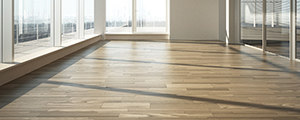With the emergence of lean construction, prefabrication of materials, design involvement and the push for more LVT, the industry is changing and customers are seeing the benefits.
By Aaron Hartung
As time marches on, new technologies, processes and techniques shape the way commercial flooring contractors operate. From lean construction and the prefabrication of materials to the increased demand for LVT and design involvement, things are changing to improve quality, reduce installation time and promote best-value decisions.
Lean Construction
The biggest change in the commercial flooring world is the push toward lean construction. This method of construction management has been passed around since the early 1990s, but has been utilized most often in the past few years. Lean construction is a mindset that seeks to minimize the waste of materials, time and effort. This can only be achieved through the participation of all project participants: the contractors, owner, end-user, managers, etc. These participants from various industries, under a variety of roles, work together instead of in isolated groups.
Under traditional construction management approaches, each contractor’s crew worked in isolation, lacking communication with the other projects. Instead, the general contractor and subcontractors for plumbing, electrical, flooring, etc., all meet regularly to determine where everyone is on their projects, how those timelines may affect everyone else’s projects and what tasks need to be done to ensure goals are met. The projects are mapped out every morning; that way no one is butting heads. Additionally, it keeps accountability high.
 Another part of lean construction is a new method for scheduling projects. Traditionally, projects were scheduled from the start date forward. Now, under what is called the Last Planner System, projects are scheduled from the end date through the start date. Scheduling a project this way allow contractors to work out issues in advance and know when things need to be done to stay on time. This is maintained through biweekly regroupings to review the schedule and stay on track.
Another part of lean construction is a new method for scheduling projects. Traditionally, projects were scheduled from the start date forward. Now, under what is called the Last Planner System, projects are scheduled from the end date through the start date. Scheduling a project this way allow contractors to work out issues in advance and know when things need to be done to stay on time. This is maintained through biweekly regroupings to review the schedule and stay on track.
Prefabrication of Materials
An important change in the commercial flooring world is the prefabrication of flooring materials. By knowing the dimensions of the upcoming project, flooring contractors are cutting the flooring materials to fit beforehand instead of traditionally doing it on-site. These prefabricated materials are then stored in the contractor’s warehouse until the project is ready to begin.
By employing the prefabrication of materials method, flooring contractors are able to keep the project’s job site clean and free of unnecessary debris while also greatly reducing the amount of time spent on-site during the installation process.
Continued Demand for LVT Floors
Luxury vinyl tiles (LVT) are not new to the commercial flooring world. What is new is the increasing demand for them and explosion of LVT manufacturers. With more LVT manufacturers comes a reduction in price and an increase in available aesthetics. LVT now comes in a huge range of prices due to a vast array of quality and design options.
The drive for LVT demand is the desire for low-maintenance, high-durability flooring options. With LVT, there is no waxing and stripping. Instead, simple cleaning methods are all that is needed for floor maintenance.
Design Involvement
As part of the change in the way flooring contractors operate, there is a recent push by flooring contactors to get involved in the design aspect of a project. Designers, architects and engineers have usually mapped out a project before a flooring contractor is even contacted. Often, they have chosen materials that don’t match with the design or are not suited for the application.
Relying on the expertise of a flooring contractor helps find the balance between aesthetics, functionality, durability and costs. It’s referred to as value-engineering and flooring contractors are implementing it on projects across the nation. While value-engineering isn’t necessarily new, its use for flooring projects is increasing.
These methods, practices and materials are emerging more and more in the commercial flooring industry. Each one is having a profound impact on the way flooring contractors approach and complete a project.
— Aaron Hartung is the communications manager at Spectra Contract Flooring, the largest commercial flooring contractor in the U.S. This article originally appeared on the Spectra Contract Flooring learning center.
